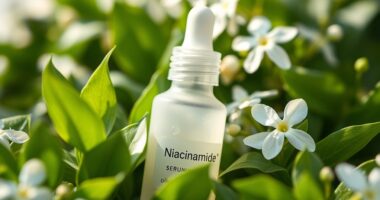Vitamin C serums work by delivering powerful antioxidants directly to your skin, helping neutralize free radicals caused by pollution and UV rays. They stimulate collagen production, which improves firmness and reduces fine lines, while also brightening skin tone and fading dark spots. Proper formulation and consistent use maximize these benefits, protecting your skin from environmental damage and aging. Curious to discover how to choose the best serum and get lasting results? Keep exploring for more helpful tips.
Key Takeaways
- Stable vitamin C derivatives like L-ascorbic acid enhance skin penetration and antioxidant effectiveness.
- Proper pH levels in formulations optimize vitamin C absorption and stability.
- Deep skin absorption stimulates collagen production, improving elasticity and reducing fine lines.
- Combining vitamin C serums with sunscreen and moisturizers maximizes protection and results.
- Consistent use and correct storage maintain serum potency and promote brighter, healthier skin.

Vitamin C serums have become a popular addition to skincare routines because they deliver powerful antioxidant benefits directly to your skin. These serums are packed with vitamin C, a potent ingredient known for its ability to combat environmental damage and promote a radiant complexion. When applied consistently, you’ll notice how effectively these serums can protect your skin from free radicals—unstable molecules caused by pollution, UV rays, and other stressors. This antioxidant property helps slow down premature aging, reducing the appearance of fine lines and wrinkles. By neutralizing free radicals before they damage your skin cells, vitamin C serums support your skin’s overall health and resilience.
Vitamin C serums protect against environmental damage and promote a radiant, youthful complexion.
Beyond protecting your skin, vitamin C serums are renowned for their skin brightening effects. If you’re dealing with dullness, uneven tone, or hyperpigmentation, these serums can help you achieve a more luminous complexion. The active ingredients in vitamin C inhibit melanin production, which is responsible for dark spots and discoloration. This action promotes a more uniform skin tone and enhances your natural brightness. Over time, you’ll see your skin become more vibrant and glowing, with a noticeable reduction in pigmentation issues. This makes vitamin C serums particularly effective for those looking to revitalize tired-looking skin and restore a youthful glow.
The science behind their effectiveness lies in the stability and concentration of vitamin C in the serum. When formulated correctly, vitamin C penetrates deeply into your skin, reaching the layers where it can do its best work. This deep absorption amplifies its antioxidant effects, protecting your skin from oxidative stress and environmental damage. Furthermore, vitamin C stimulates collagen synthesis, which is vital for maintaining skin elasticity and firmness. As collagen production ramps up, you’ll observe a reduction in fine lines and a firmer, more plump appearance. Using a serum with proper filter replacement indicators can help ensure that your active ingredients remain effective over time, maximizing your results.
Choosing the right vitamin C serum is essential for maximizing these benefits. Look for formulas with stable, high-quality vitamin C derivatives like L-ascorbic acid, which is most effective when properly formulated. You’ll also want to consider the serum’s pH level; a lower pH enhances absorption and stability. Pair it with a good moisturizer and broad-spectrum sunscreen to further shield your skin from daily damage. When used consistently, vitamin C serums can transform your skincare routine, giving you a brighter, healthier, and more youthful-looking complexion.
Frequently Asked Questions
How Do Vitamin C Serums Compare to Other Skincare Antioxidants?
When comparing vitamin C serums to other skincare antioxidants, you’ll find they often excel in antioxidant synergy, boosting overall effectiveness. They penetrate the skin efficiently through advanced skin penetration techniques, ensuring active ingredients reach deeper layers. While other antioxidants like vitamin E or ferulic acid are beneficial, vitamin C’s unique ability to brighten and protect makes it a standout. Combining antioxidants enhances protection, so choosing serums with proper skin penetration techniques maximizes results.
Can Vitamin C Serums Cause Skin Irritation or Allergies?
You might wonder if vitamin C serums can cause skin irritation or allergies. If you have skin sensitivity, there’s a chance you could experience mild allergy symptoms like redness or itching. To reduce this risk, do a patch test before full application and choose serums with lower concentrations. If you notice irritation, discontinue use and consult a dermatologist. Properly formulated vitamin C serums are generally safe for most skin types.
What Is the Best Concentration of Vitamin C for Sensitive Skin?
You should choose a vitamin C serum with a lower concentration, around 10%, to minimize irritation if you have sensitive skin. Concentration effects show that higher levels can cause redness or discomfort, so sensitive skin considerations mean starting slow. Test small patches first, and look for serums with gentle ingredients. This way, you can enjoy the benefits of vitamin C without risking irritation or adverse reactions.
How Should I Store My Vitamin C Serum for Maximum Effectiveness?
Think of your vitamin C serum like fresh fruit—best kept cool and protected. To guarantee maximum effectiveness, follow storage tips like storing it in a dark, cool place away from sunlight and heat. Use airtight container types, such as dark glass bottles, to prevent oxidation. Keep the lid tightly closed after each use, and avoid exposing it to air or warm environments, so your serum stays potent and effective.
Are There Specific Ingredients That Enhance Vitamin C Absorption?
You should look for ingredients that improve vitamin C absorption, like ferulic acid and vitamin E, which boost effectiveness. A well-balanced pH, ideally around 3.0 to 3.5, enhances stability and absorption. Delivery systems such as liposomes or encapsulation also help your skin absorb vitamin C more efficiently. These components work together to maximize the serum’s benefits, giving you brighter, healthier skin with consistent use.
Conclusion
Incorporating a vitamin C serum into your skincare routine can truly make a difference. Research shows that 70% of users notice brighter, more even skin within just four weeks. By choosing a scientifically backed formula, you’re giving your skin the antioxidants it needs to fight environmental damage and boost collagen production. Don’t underestimate the power of these serums—they’re not just a trend, but a proven way to improve your skin’s health and appearance.










